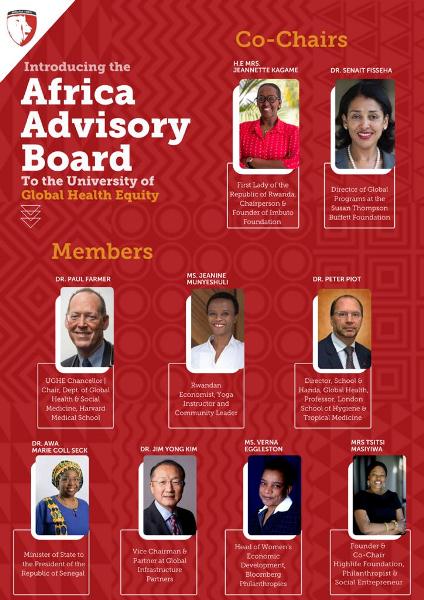
First Lady Jeannette Kagame has been named among chairs of the Advisory Board of the University of Global Health Equity (UGHE) Rwanda located in Butaro, Burera district of Northern Province.
She will co-chair the Advisory Board along with Professor Senait Fisseha, Director Global Programs, Buffett Foundation.
Buffett Foundation is an organization aimed at catalyzing transformational change to improve the standard of living and quality of life, particularly for the world’s most impoverished and marginalized populations.
Inaugurated in 2018, UGHE releases graduates with Bachelor and Master’s in global health sciences.
Its curriculum has similar course units with those of Harvard in the United States.
The Advisory Board will be instrumental to UGHE’s ambitious mission of building a robust healthcare workforce in Africa to provide equitable, quality health services to all, and supporting the continent’s path to self-reliance in health by advancing its human resource potential.
Additional to providing guidance on the institution’s strategic development and implementation, the Advisory Board will support UGHE’s efforts to expand its academic programs and its overall reach according to the needs of the African continent.
Through a statement released by UGHE today, First Lady Jeannette Kagame
stated that ‘to afford all human beings access to the quality health services and care they need, when they need them, is to afford them dignity and control over their own lives’.
“To achieve this, however, we need more than strong policies, laws and mechanisms in the health sector. We need the right people in the right places, making the right decisions at the right time, to guarantee every individual’s right to health,” she noted.
Prof. Senait Fisseha has said that advancing the human resource potential and self-reliance in African health systems, requires global health institutions like UGHE that train clinicians, passionate and compassionate global health leaders, innovative researchers, scientists and implementers, health entrepreneurs, and managers on the continent.
“Our UGHE’s new African Advisory Board of prominent leaders and experts will support our institute drive a human centered resource development agenda, and we are proud to unite their visions, actions, exhibited competency and commitment to help move this health equity forward,” he stressed.
The Advisory Board is expected to bring together eminent African leaders and global health leaders from diverse fields, sectors, genders and geographies; people whose respective careers have helped advance both human and socio-economic development on the continent. The Advisory Board will also invite selected global leaders to share their knowledge and expertise gained from their work on the continent and globally.
Many African populations face significant geographic and financial barriers to accessing basic health care, and delivery of these services is compromised by a scarcity of health facilities, modern medical equipment, and skilled healthcare professionals.
The COVID-19 pandemic has especially highlighted the need for increased research and manufacturing capacity in Africa to bolster the development of life-saving drugs, equipment, and vaccines on the continent and to achieve this, skilled professionals also need to be educated.
By educating generations of global health leaders to provide equitable, quality health services; UGHE aims to improve healthcare delivery in Africa and beyond and provide lessons that can be implemented worldwide.
To provide innovative solutions to health’s pressing challenges, students are equipped with the skills to carry out clinical and global health research, as well as the expertise and know-how to build, strengthen and manage resilient healthcare systems prepared to respond to emerging health threats like COVID-19.
UGHE was inaugurated in 2018 through the partnership of Partners in Health, the Government of Rwanda, Cummings Foundation, Bill & Melinda Gates Foundation and Havard University among others.
UGHE focuses on quality, innovation and scientific-based learning and requires that students learn from and live within the communities facing the aforementioned constraints to healthcare access. By situating the university in the rural North of Rwanda, it provides proximity education that exposes our students to the challenges that they will be tasked to address on the continent.
Through a community-based learning approach that leverages community members as teachers, students are equipped with a deep understanding of the needs of the vulnerable, positioning them to adequately address them in their future professional life. By applying these principles, UGHE breaks down traditional boundaries between academic disciplines, fostering interprofessional teaching and learning.(End)
